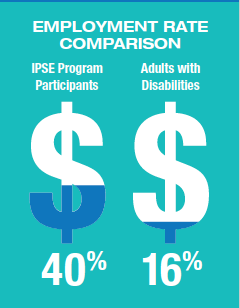Expert Update: IPSE Grows across the Nation
By Cate Weir, M.Ed.
The historical growth of inclusive post-secondary education (IPSE) options nationally has been slow, but a grassroots effort has led the way since the late 1990s.
Before the Higher Education Opportunity Act of 2008, IPSE programs were started by a mom or a dad who wanted a college experience for their child. That still happens today. Parents are a huge impetus for the development of these programs, working with their networks, making connections and making the case so new opportunities are available.
There are now approximately 265 programs nationally that meet the fundamental definitions of inclusive post-secondary education for youth with intellectual disabilities. Some of the main things that are happening nationally are a result of funding by the Think College National Coordinating Center (TCNCC).
The First Cohort
 In 2010, the first cohort of approximately 2,100 students participated in a model demonstration project, Transition and Post-secondary Programs for Students with Intellectual Disabilities (TPSID). In the first five years, Think College collected data on students up to 90 days after graduation and those who left the program. We found a 40% paid competitive employment rate among all the program participants from year one to year five. In context, National Core Indicators Data clocked in employment per adults with disabilities at around 16%.
In 2010, the first cohort of approximately 2,100 students participated in a model demonstration project, Transition and Post-secondary Programs for Students with Intellectual Disabilities (TPSID). In the first five years, Think College collected data on students up to 90 days after graduation and those who left the program. We found a 40% paid competitive employment rate among all the program participants from year one to year five. In context, National Core Indicators Data clocked in employment per adults with disabilities at around 16%.
Through this study, we are seeing decent employment rates for graduates, and are now embarking on a more comprehensive data collection. Over the next five years, Think College will produce a more robust report on outcomes for these students. The second cohort of students launched in 2016.
Person-centered Approach
Employment is important, but things like being able to live in your own apartment, living with friends you made in college, feeling more self aware, being a better self-advocate and learning to coordinate a person-centered planning team around your life are also important outcomes. IPSE college programs really do a good job with person-centered planning, which 100% of the programs are using.
Students are learning how to access adult support services which is very important for their quality of life. They have the opportunity to run their own meetings and set their own goals for themselves within the program.
There are several other things that will certainly impact Georgia and other programs nationally. In the last five years, 2010-2015, Think College has developed model accreditation standards for IPSE programs.
Currently there are no set standards of practice, but Think College at least defined foundations for setting up programs. However, IPSE programs are not accredited like other higher education programs at a college or a university.
TCNCC is working on how that accreditation process will work, who might be the accrediting agency or whether our own accrediting agency must be created.
Related to accreditation is the concept of the kind of credentials students can earn in these programs. Initially, the idea behind IPSE was that students would attend, have a college experience, learn and get employment. But what will they earn?
That’s one of the first questions a typical college student asks: what will I earn when I graduate? For IPSE, this was not even on the radar 20 years ago. But now, we’re really focusing on what it means to attend one of these programs. If an employer is interviewing two students – one who went to the IPSE program at Georgia Tech and one who did not, what does the employer think about their credentials?
Benchmarks
 Alexandria Goodman, one of the first graduates of the Georgia Tech Excel IPSE program, stands with Excel’s Director Ken Surdin at the 2017 Certificate Ceremony.Right now, Think College has hundreds of students and would like to have 2,000-3,000 follow-up records. For a robust report, we need a good group of students that we hear from every year who tell us what they’ve been doing and what their outcomes have been.
Alexandria Goodman, one of the first graduates of the Georgia Tech Excel IPSE program, stands with Excel’s Director Ken Surdin at the 2017 Certificate Ceremony.Right now, Think College has hundreds of students and would like to have 2,000-3,000 follow-up records. For a robust report, we need a good group of students that we hear from every year who tell us what they’ve been doing and what their outcomes have been.
We also pay a lot of attention to what happens in the programs themselves. What are the program’s practices? For example, the Higher Education Opportunity Act states that students in IPSE programs need to be participating in academic opportunities with peers without disabilities at least 50% of the time. We have yet to see 50% academic inclusion in the data we collect, but we constantly support this goal.
Program practices that we have benchmarked are more paid employment, paid employment within the program and growing inclusive academic opportunities. We want to see every campus have an IPSE program where students can live on campus, but outside data shows that currently 32% are not eligible.
Many nonresidential programs do an excellent job of having students come to campus every day. And they’re not only going to class, but participating in clubs and working on campus. But while this maximizes opportunities, there is a different experience when you really live on campus. It creates the support structure people need 24/7 away from home and can remove additional barriers.
WIOA
Georgia’s Workforce Innovation and Opportunity Act (WIOA) has been a model in terms of how to implement WIOA through the use of IPSE for transition services and for employment outcomes for people with intellectual disabilities.
WIOA specifically mentions IPSE opportunities for people with intellectual disabilities, and also focuses on transition-aged youth, spending 25% of their budget on transition services. However, it’s important these programs do not turn into work programs where someone just gets a vocational certificate. Students should not only have that option, but also inclusive choices like every other college student.
Georgia’s Growth
Georgia has seen remarkable growth with seven IPSE programs across the State and more in the planning stages. This brings a variety of options to people in Georgia because they are different kinds of colleges, which offer different courses of study.
The State has an organized infrastructure led by Georgia State University, which has always been strong. While Georgia currently has a federal grant, it was previously doing great work partnering with agencies like Vocational Rehabilitation. Georgians were advocating at the legislative level. What Georgia is doing is really the future of inclusive post-secondary education.
Cate Weir, M.Ed. is the program director of the Think College National Coordinating Center (TCNCC), funded by the Office of Postsecondary Education at the US Department of Education. TCNCC is a training and technical assistance center focused on post-secondary education for students with intellectual disabilities at the Institute for Community Inclusion at the University of Massachusetts Boston. Weir manages all aspects of the national technical assistance center, including product development and dissemination, national technical assistance provision, and large scale and targeted training.
To read the entire magazine, see below:
Listen to the audio version of the magazine by clicking on the orange "Play" button below:


